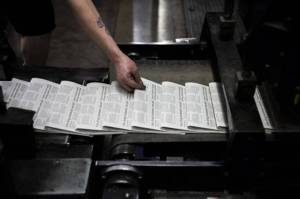Comment: State’s climate investments should start with kids
Published 1:30 am Wednesday, April 19, 2023
By David Jones and Scott Meyer / For The Herald
We may have different backgrounds — one of us is a professional educator and the other an expert on electric vehicles — but we are in complete agreement that there is a need for the Washington state Legislature to allocate climate cash toward solving the toughest and most urgent climate pollution problem: emissions from our region’s transportation.
Cleaning up heavy vehicles such as school buses is one key way to give some relief to kids’ lungs and ultimately save school districts money.
The start of most days includes seeing yellow school buses making their way through our neighborhoods. So many students get to school on buses that our public school bus systems are actually the largest public transportation system in the country.
David: As a principal, I monitored students arriving on school campus each morning. I already knew that some were starting their day steps behind their classmates, because of exposure to pollution from exhaust on their ride to school.
Research has linked dirtier buses to worse attendance. Diesel-engine school buses, even the newer “clean diesel” models, can expose kids and drivers to as much as four times the diesel exhaust as their classmates walking to school or riding in a car. The federal Environmental Protection Agency has directly linked diesel exhaust exposure to asthma. The National Institutes of Health reports that asthma is the most chronic common disease found in children, accounting for more than 10 million missed school days annually. That’s 10 million times students have been denied an equal opportunity to learn each year.
A tragically straight line connects these cascading facts: Exposure to diesel exhaust increases asthma which leads to school absences and the resulting impact on academic advancement. Families who live in neighborhoods next to transportation corridors experience the harms even more.
It doesn’t have to be this way. Replacing diesel buses with clean battery electric school buses puts a stop to this tragic sequence. It’s a solution many districts wish they could provide. Everett Public Schools, for example, had high hopes of adding 10 e-buses to the routes serving their communities this year. There was only one hitch: the upfront cost.
Across our nation there are twice as many vehicles transporting students to and from school than in all other forms of mass transportation combined. All but a very few of these buses run on diesel, and most are in use for over 30 years, meaning they operate on older, less clean technology.
In addition to producing toxic air pollution, diesel is a fossil fuel. Tailpipe emissions from medium- and heavy-duty vehicles — such as trucks, vans, city transit and school buses — have doubled since 1990 and remain our region’s largest contributor to greenhouse gases.
We now have an opportunity to accelerate the transition to cleaner vehicles.
Scott: As a sales manager of school and van fleets, I know there are many barriers for districts, especially small ones, to acquire electric school buses. The No. 1 roadblock is the upfront cost of these vehicles and charging equipment. A new electric school bus can cost twice that of a diesel; but once acquired, the maintenance and energy-use costs are much lower and more predictable. There are 10,000 public school buses operating daily in Washington state and school districts across the state purchase approximately 700 new buses every year. Each new bus is an opportunity to help students and districts.
School districts and other entities wanting to use zero-emission heavy-duty vehicles — including semi trucks, garbage trucks, city buses and more — should get help from the state with the upfront vehicle and charging infrastructure costs. The federal government has programs like the EPA’s Clean School Bus Program, but we need more. Many school districts in Washington applied for those federal funds but were denied because there is only so much from the federal pot of money; in the last round, only three school districts in Washington — Toppenish, South Whidbey and Tekoa — received federal help with that upfront purchase cost. Compare that with the standard rebate routinely available for anyone purchasing a new e-vehicle for their own use.
Now, with new revenue generated from the state’s Climate Commitment Act at its carbon emissions auctions, we don’t have to wait. The state Legislature should go big and fund programs for more electric buses and other zero-emission heavy duty vehicles, especially in communities in heavy pollution corridors.
The House of Representatives’ proposed budget allocates close to $275 million to clean up medium- and heavy-duty vehicles; including $15.6 million specifically for school buses. The state Senate needs to match that amount. With less than a week remaining in this year’s legislative session, the Senate should follow the House’s lead and act to protect our children, our communities and our climate by funding needed clean energy and transportation solutions now.
David Jones served as a public school principal for decades and is now retired. Scott Meyer is the school bus sales manager for Oregon and Washington for Schetky Bus and Van Sales.


